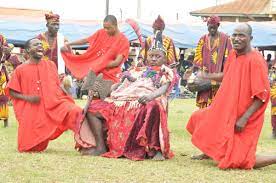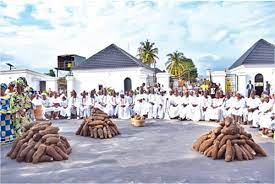
The Durbar Festival in Nigeria is an ancient tradition that has been celebrated for centuries. This vibrant festival is a celebration of the Hausa people and their culture, featuring colorful traditional dress, impressive horsemanship, and ceremonial pageantry.
Every year, people from all over the country gather to celebrate the rich heritage of the Hausa people, and the event is an incredible display of Nigerian culture.
In this blog post, we'll take a closer look at the history of the Durbar Festival, and give you all the information you need to know about attending the celebration.
History of Durbar Festival in Nigeria
Durbar festival is one of the most celebrated festivals in Nigeria, particularly among the Northern Nigerian communities. The festival is steeped in history and has been celebrated for hundreds of years.
The origins of the festival can be traced back to the 14th century during the reign of the Sokoto Caliphate, one of the largest and most powerful empires in Africa at the time. The Durbar festival was used to celebrate and display the military strength of the empire. It was also used as an opportunity to showcase the splendour and wealth of the emirs and nobles in the kingdom.
The festival was also used to mark important Islamic holidays such as Eid al-Fitr and Eid al-Adha. During the festival, the emir and his entourage would ride on horseback or camels in a grand procession to the central square or field. This was to show the power and might of the emirate to the people.
Over the years, the festival has evolved into a cultural event that celebrates the rich history and traditions of the Nigerian people. Today, the Durbar festival is celebrated in different parts of Nigeria, and it has become a symbol of Nigerian cultural identity.
In recent times, the festival has taken on a more inclusive tone with different ethnic groups and religious denominations joining in the celebrations. The Durbar festival has become a platform for promoting peace, unity, and cultural exchange in Nigeria.
Significance of Durbar Festival to Nigerian Culture
The Durbar Festival is an essential cultural event in Nigeria that holds great significance to the country's history and traditions. For centuries, it has been celebrated in various parts of Northern Nigeria, particularly in the Hausa-speaking states.
The festival dates back to the pre-colonial era when it was held to honor the emirs and leaders of the Northern regions. It is still observed in honor of these traditional rulers who are highly regarded in Nigerian culture.
The festival is also a platform for showcasing the rich cultural heritage of Northern Nigeria. It provides an opportunity for tourists and visitors to witness and experience the unique culture of the region.
Furthermore, the Durbar Festival serves as a symbol of unity and strength amongst the people of the Northern regions. It fosters a sense of community and togetherness, promoting harmony and peace amongst different ethnic groups.
The festival also has religious significance, as it is held during Eid-al-Fitr and Eid-al-Adha celebrations in Muslim-dominated regions. The celebration marks the end of Ramadan, the holy month of fasting and prayer, and the commemoration of Prophet Ibrahim's willingness to sacrifice his son for Allah.
In summary, the Durbar Festival is a vital cultural event that represents Nigeria's rich history, traditions, and religious beliefs. It is a symbol of unity, strength, and community, promoting peace and harmony amongst different ethnic groups.
Festivities and Activities during Durbar Festival
Durbar Festival is a week-long celebration that takes place across different states in Northern Nigeria, and it is characterized by a host of festivities and activities that are steeped in tradition. Some of the most notable festivities during the Durbar Festival include:
Horse Riding: The highlight of Durbar Festival is undoubtedly the horse riding displays, where local aristocrats and nobles show off their horsemanship skills in colorful parades. Participants typically wear their finest traditional attire, and they ride their horses with a sense of pride and elegance that is truly captivating.
Processions: Apart from the horse riding displays, Durbar Festival also involves colorful processions that feature music, dance, and theatrical performances. These processions often have a religious connotation and are held to honor the Emir of the region.
Markets: Durbar Festival is also a great time to indulge in some local shopping, as there are usually markets set up during the festivities. These markets are a great place to purchase traditional wares such as handcrafted jewelry, woven textiles, and wood carvings.
Food: Like any good festival, Durbar Festival features an abundance of local cuisine. Attendees can expect to savor dishes such as jollof rice, suya (grilled meat skewers), and akara (deep-fried bean cakes). Traditional drinks such as kunu and zobo are also a must-try.
Fireworks: To cap off the festivities, Durbar Festival often ends with an impressive display of fireworks. The fireworks light up the sky, adding a colorful and magical touch to the already vibrant celebrations.
Overall, Durbar Festival is a time to celebrate the rich culture and traditions of Nigeria's northern region. Whether you're a visitor or a local, there is something for everyone to enjoy at this spectacular festival.
Dress Code for Durbar Festival
Durbar Festival is an annual cultural celebration that takes place in different parts of Nigeria. It is an opportunity for Nigerians to come together and showcase their rich cultural heritage. One important aspect of Durbar Festival is the dress code.
The dress code for Durbar Festival is usually traditional attire, which varies depending on the location and ethnic group. For instance, in the northern part of Nigeria where the festival is popularly celebrated, men typically wear long colorful robes known as "Babanriga" while women wear brightly colored wrappers or hijabs.
The dress code also includes wearing traditional accessories such as hats, turbans, and scarves. For men, it is important to wear a turban that matches their outfit while for women, it is common to wear elaborate head-ties or gele to complement their outfit.
It is important to note that the dress code is not limited to traditional attire only. Some people also wear modern outfits that have traditional elements to them. This helps to create a unique fusion of modern and traditional fashion styles.
Furthermore, it is important to dress conservatively during Durbar Festival as it is a cultural event that attracts people of all ages and backgrounds. Avoid wearing revealing clothing, and keep your accessories and makeup to a minimum.
Traditional Music and Dance Performances during Durbar Festival
The Durbar Festival is known for its rich cultural display, and traditional music and dance performances play a significant role in this celebration. These performances add to the already colorful and vibrant atmosphere that can be seen throughout the festival.
During the festival, people gather together to witness a display of traditional horse riding and the various styles of dance and music. Performers usually dress in brightly colored traditional attire and use drums, flutes, and other traditional instruments to produce enchanting sounds that fill the air.
One of the most common traditional dances during the Durbar Festival is the "Kare-Kare" dance, performed by the Hausa people of Northern Nigeria. It involves energetic movements that showcase the dancers' agility and flexibility, while the musicians use a combination of percussion and strings to produce captivating beats.
Another dance performed during the festival is the "Gobirawa" dance. This dance is associated with the emirate of Gobir and is often performed during special events such as the coronation of a new emir. The dancers wear long robes with colorful embroidery, and the musicians use flutes, drums, and the talking drum to produce rhythms that accompany the dancers' movements.
The festival also features performances by the "Ganuwar Kori" singers, who are renowned for their melodious voices and powerful lyrics. Their music, which is usually accompanied by traditional instruments, speaks about the various challenges faced by the people in their daily lives.
Overall, the traditional music and dance performances during the Durbar Festival offer a unique glimpse into Nigerian culture and traditions. They provide an opportunity for people to come together and celebrate their heritage while showcasing their skills and talent to the world.





















